Eat Healthy & Speak Italian
Ever wondered why Italians look great even though they consume quite an amount of carbohydrates? Well, the answer lies in the secrets of the Mediterranean diet. According to the Mayo Clinic: “If you're looking for a heart-healthy eating plan, the Mediterranean diet might be right for you. It incorporates the basics of healthy eating — plus a splash of flavorful olive oil and perhaps a glass of red wine — among other components characterizing the traditional cooking style of countries bordering the Mediterranean Sea.”
IACE, the Italian American Committee on Education has decided to plant a seed of this important knowledge in the youngster population of the tri-state area with the introduction of a series of classes in which hundreds of kids ages 10-15 will learn to prepare meals alongside a famous Italian chef at the International Culinary Institute and at the same time will get an introduction to the Italian language and a taste of the Italian culture.
The 6th of March marked the kick off of the series of classes organized by IACE and sponsored by Barilla, a food company that leads in the global past business. “Mangia Sano e Parla Italiano,” or otherwise “Eat Healthy and Speak Italian” was the opening event in the series and was held at the International Culinary Institute (462 Broadway at the corner of Grand, New York City). The importance of healthy eating and the introduction and exposure to the Italian culture are two things that the New York consul general Natalia Quintavalle finds crucial for the enrichment of the young generation and also for preservation of Italian heritage. At the opening of the event she stated: “We as Italians are very much linked to the idea of the Mediterranean diet. The Mediterranean diet was inscribed on the representative List of Intangible Cultural Heritageof humanity.” The Lists of Intangible Cultural Heritage are established by UNESCO and aim to ensure protection of important intangible cultural heritages worldwide as well as the awareness of their significance. She continued: “We are really very proud about that. The Mediterranean diet constitutes of an ensemble of all the skills and knowledge which make the Italian cuisine, or the Mediterranean cuisine something very special, something which remained constant over time and proved its solidity and its importance.”
At the opening event the president of IACE Berardo Paradiso stated: “The Italian cuisine is great because it is simple. The most important thing about Italian cuisine is the fresh ingredients which one has to know how to mix and dose them.” He then informed the guests of some of the highlights of the IACE’s initiative: “Next week we are bringing the students to the opera, each year we bring almost 2000 kids to the opera, so they can learn the Italian culture through music. One month from now we are planning to show them Italian high technology at the Ferrari showroom. We have almost 42,000 children in the tri-state area that we reach out to on regular basis. All this is possible thanks to the Italian Government and the Italian Embassy of Washington, and our “angels in Italy” as they give us almost 70% of the funds that allow us to give to the schools to promote the Italian classes and Italian language.” He expressed his sincere gratitude to Antonio Benetti, the director of the Italian language program at the Italian Consulate of NY and Lucia Pasqualini, the vice consul for their dedication to the project. He also conveyed a distinctive appreciation to Maria Teresa Cometto, one of the Board of Directors members, whom he called “the instrument that put this project together and brings 4-5 thousand kids to this program.” He proudly informed the public of the fact that Italian has now become the second most popular foreign language (after Spanish) in the United States.
The guest chef, along whom the kids got an opportunity to cook was Cesare Casella, the Dean of The School of Italian Studies at the International Culinary Center in New York and chef of Salumeria Rosi, a renowned restaurant and salumi shop on the Upper West Side of Manhattan. He passionately spoke of the simplicity of Italian cuisine and of the significance of usage of fresh ingredients. Chef Casella satirically painted a picture to the students of how vital it is to be flexible in your cooking in order to try to always incorporate the best and the freshest ingredients. He Explained: “Italians when they go to the markets they go with their minds set on making fish, and not necessarily on making red snapper.” He continued: “ When you arrive at the market you need to see which fish smiles to you. The red snapper may be dull and grayish and very sad looking, instead the sea bass may look at you with its bright eyes saying take me home!”
Clearly the kids were having fun watching chef Casella slice, mix and simmer the ingredients. At the same time they were being introduced to the Italian names of all the ingredients used in the three recipes prepared during the class and to the various verbs involved in the cooking process. They vivaciously repeated after the teacher words like “cipolla,” “aglio,” “mescolare,” “bolire,” and one of their favorites, perhaps for the difficulty in recalling it: “olio extravergine di oliva.” They joined the chef in the kitchen and made pesto from scratch, they learned to roll home made gnocchi and they hand crushed tomatoes for a “real Italian salsa,” learning at the same time that “salsa” means sauce and it has nothing to do with the Mexican salsa served with corn chips.
In the times when the focus on nutrition and healthy eating is high, classes like this should be offered more often. Not only are the kids more likely to start eating healthier, but when having fun children pay a lot more attention and learn quicker. This is important for both, learning about nutrition and learning language skills. This is a wonderful initiative of IACE and their supporters. More organizations and institutions should follow in their food steps.






























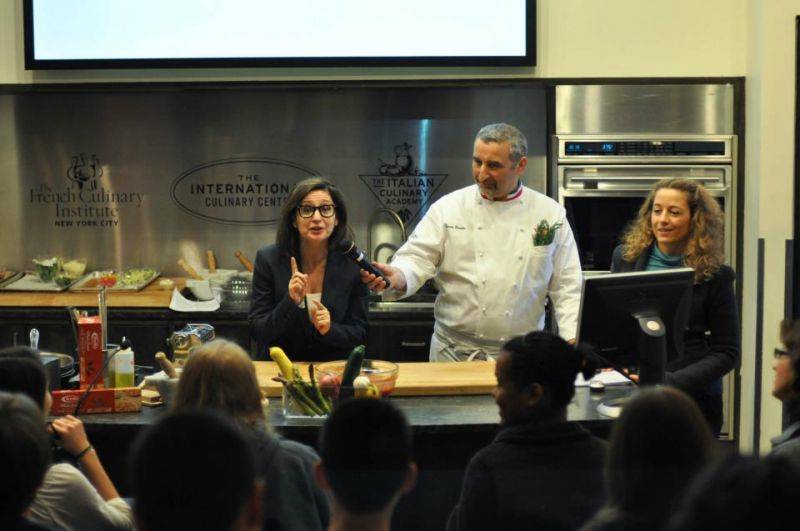

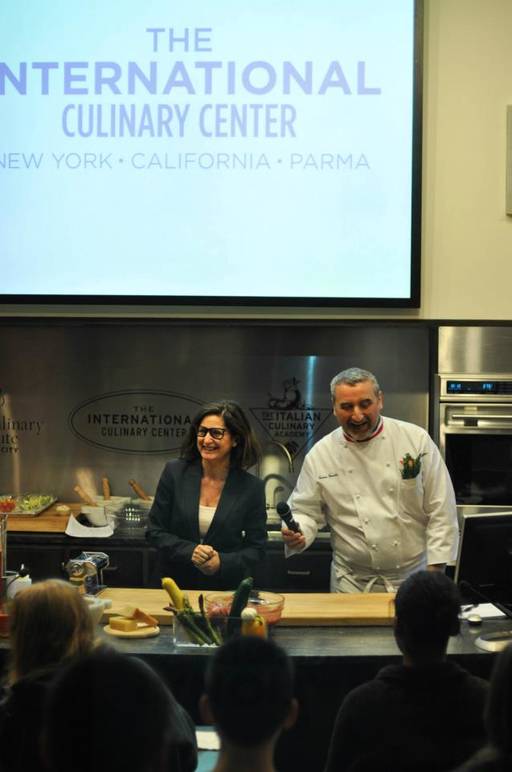
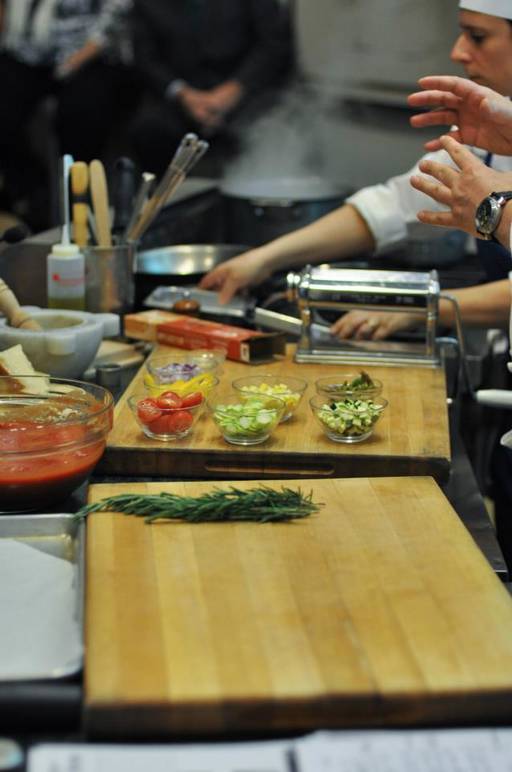
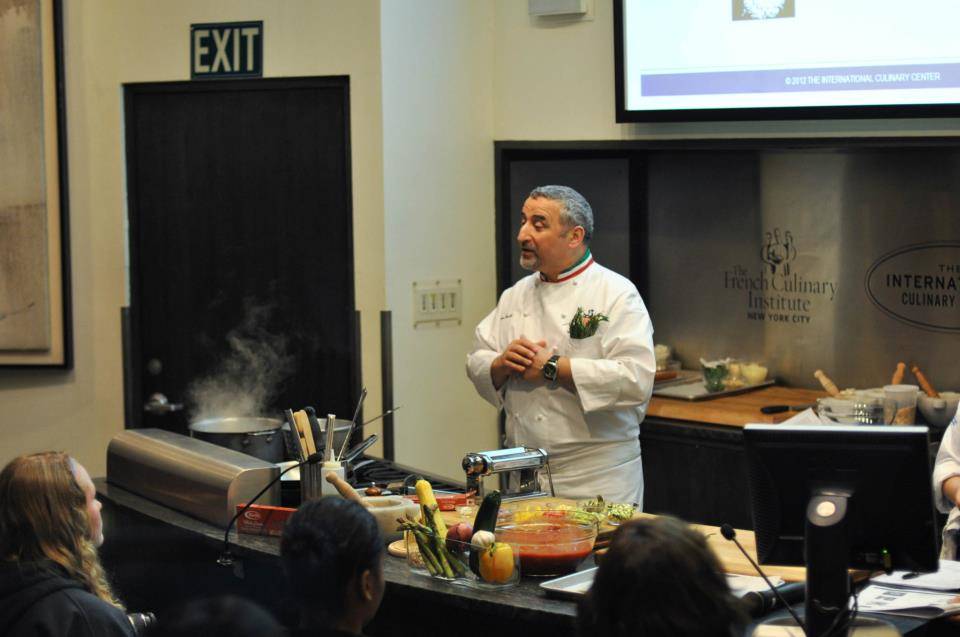
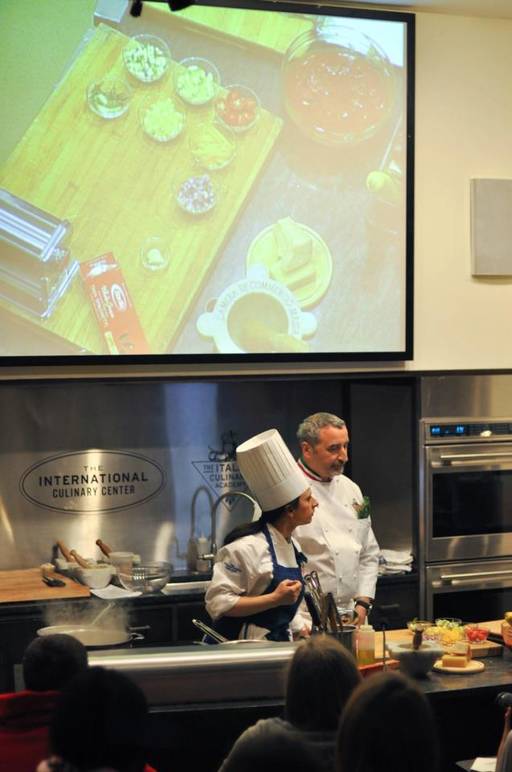
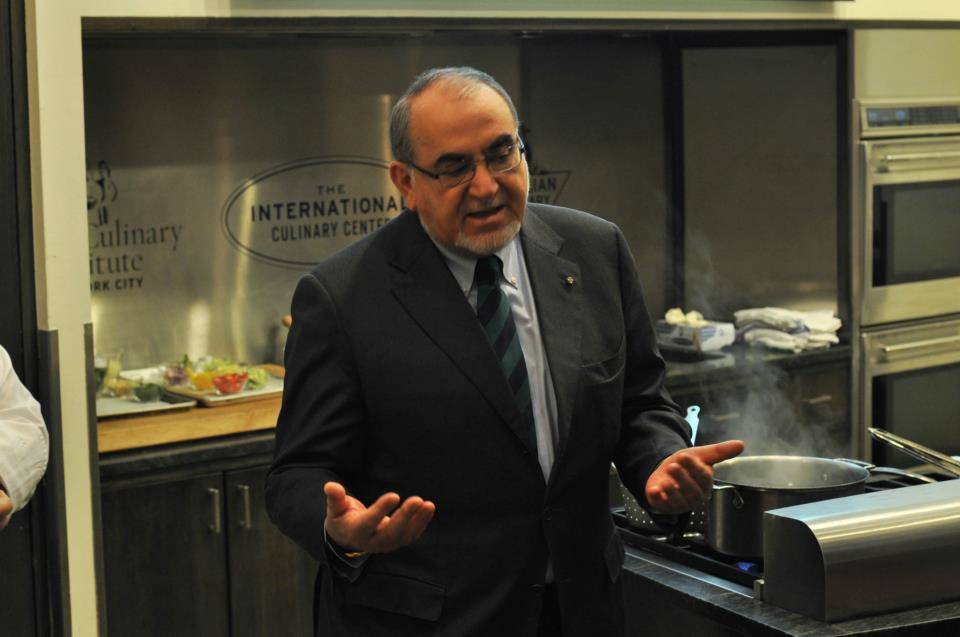



i-Italy
Facebook
Google+
This work may not be reproduced, in whole or in part, without prior written permission.
Questo lavoro non può essere riprodotto, in tutto o in parte, senza permesso scritto.